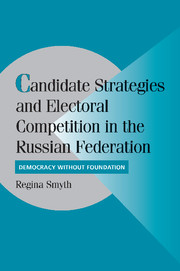 Candidate Strategies and Electoral Competition in the Russian Federation
Candidate Strategies and Electoral Competition in the Russian Federation Published online by Cambridge University Press: 25 July 2009
Ideally, this study would include all of the postcommunist cases. However, I excluded Serbia and Montenegro since the constitution was not adopted until 2003 near the end of this study. I also excluded Bosnia and Uzbekistan, and Turkmenistan because it was not possible to collect the necessary data for those cases. Twenty-two cases are included in the study: Albania, Armenia, Azerbaijan, Belarus, Bulgaria, Croatia, Czech Republic, Estonia, Georgia, Hungary, Kazakhstan, Kyrgyzstan, Latvia, Lithuania, Macedonia, Moldova, Poland, Romania, Russia, Slovakia, Slovenia, and Ukraine.
The Dependent Variable
The dependent variable is measured as a country's Freedom Score (the average of the political rights and civil liberties components of the scale) in 2003. Alternative specifications of the model using a 0 (unconsolidated), 1 (consolidated), or 1 (unconsolidated), 2 (partially consolidated), or 3 (authoritarian) using logistic regression yield the same results but raise technical problems when calculating the robustness of the parameters.
Cultural Variables
WVS (measure of popular support for the old regime). To measure popular affect toward the old regime, I used the WVS question number 163 drawn from the 1999–2001 wave. The question was worded as follows:
People have different views about the system for governing this country. Here is a scale for rating how well things are going: 1 means very bad; 10 means very good.
To save this book to your Kindle, first ensure no-reply@cambridge.org is added to your Approved Personal Document E-mail List under your Personal Document Settings on the Manage Your Content and Devices page of your Amazon account. Then enter the ‘name’ part of your Kindle email address below. Find out more about saving to your Kindle.
Note you can select to save to either the @free.kindle.com or @kindle.com variations. ‘@free.kindle.com’ emails are free but can only be saved to your device when it is connected to wi-fi. ‘@kindle.com’ emails can be delivered even when you are not connected to wi-fi, but note that service fees apply.
Find out more about the Kindle Personal Document Service.
To save content items to your account, please confirm that you agree to abide by our usage policies. If this is the first time you use this feature, you will be asked to authorise Cambridge Core to connect with your account. Find out more about saving content to Dropbox.
To save content items to your account, please confirm that you agree to abide by our usage policies. If this is the first time you use this feature, you will be asked to authorise Cambridge Core to connect with your account. Find out more about saving content to Google Drive.